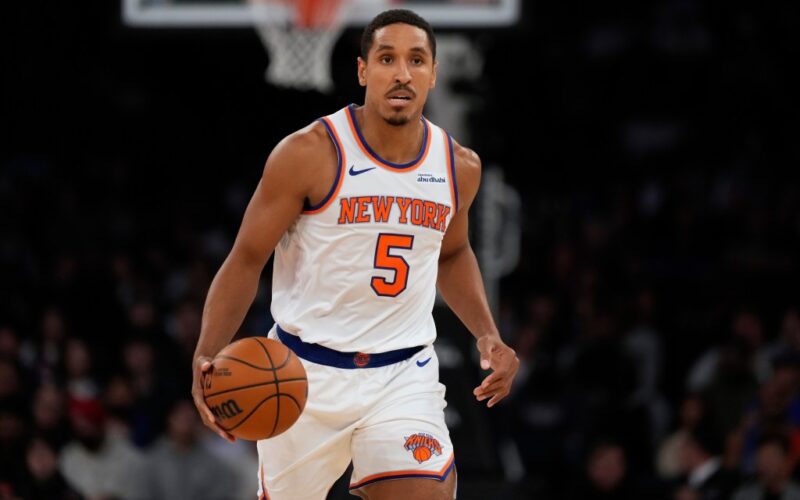Can’t say anyone saw that coming.
The Knicks brought veteran floor general and 2017 Rookie of the Year Malcolm Brogdon into training camp on a non-guaranteed deal — an experienced leader expected to stabilize the second unit and contribute to a team with championship ambitions in the Eastern Conference.
That vision didn’t last long.
Four preseason games into camp, with one left before opening night against the Cleveland Cavaliers, Brogdon abruptly announced his retirement from basketball through ESPN.
“Today I officially begin my transition out of my basketball career. I have proudly given my mind, body and spirit to the game over the last few decades,” Brogdon said in a statement on Wednesday. “With the many sacrifices it took to get here, I have received many rewards. I am deeply grateful to have arrived to this point on my own terms and now to be able to reap the benefits of my career with my family and friends. Thank you from the bottom of my heart to all who have had a place in my journey.”
Brogdon’s sudden retirement closes the book on a once-promising career marked by high-IQ play and relentless professionalism — but also one derailed by a steady stream of injuries over nine seasons.
“He’s a hell of a player and we’re lucky to have him,” said Karl-Anthony Towns. “But man, his presence in the locker room and who he is as a man is something I’ve been able to notice off the court a little bit. To be here every day with him and be in his presence every single day for the amount of hours we’ve spent here as a team, he’s a special human being. And being able to call him my teammate is something I don’t take lightly for sure.”
For the Knicks, the timing adds another wrinkle to their preseason calculus. With one exhibition left before the regular-season opener, New York suddenly finds itself with one more roster hole than expected and a critical decision to make before Oct. 18 — the deadline to set the roster for Opening Night against the Cleveland Cavaliers at Madison Square Garden on Oct. 22.
BROGDON WAS SUPPOSED TO BE BRUNSON’S BACKUP
That was the plan — a steady veteran presence to stabilize the second unit and ensure the offense didn’t stall when the All-Star guard hit the bench.
The reserve point guard role had been one of New York’s biggest pain points last season, particularly in the Eastern Conference Finals, when Tom Thibodeau benched backup Cameron Payne as Indiana’s T.J. McConnell methodically dissected the Knicks’ defense one probing drive at a time.
New York’s front office moved aggressively this offseason to prevent history from repeating itself, signing Jordan Clarkson and Guerschon Yabusele to bolster a bench that ranked dead last in scoring league-wide. Clarkson, the 2021 Sixth Man of the Year, gives the Knicks an instant-offense spark plug — he’s led all reserves in total points off the bench over the last five seasons. Yabusele, meanwhile, provides frontcourt flexibility and a physical presence in the minutes once filled by Precious Achiuwa.
Brogdon was meant to complete that picture — a high-IQ playmaker and reliable decision-maker to organize second-unit possessions. Instead, his retirement leaves a sudden void at backup point guard, forcing Mike Brown and his staff to re-evaluate the depth chart and establish a new pecking order behind their franchise centerpiece.
GOOD THING KNICKS DIDN’T TRADE KOLEK
When New York signed Brogdon, Landry Shamet, and Garrison Mathews to training camp deals, it did so with little financial breathing room — just one veteran’s minimum slot available beneath the restrictive second apron. Under those circumstances, adding both Brogdon and Shamet to the Opening-Night roster would have required clearing space via trade.
And with Brogdon expected to log minutes at point guard, Kolek — an unproven second-year prospect — became a logical candidate to move if the Knicks needed to shed salary.
That idea looks a little different now.
Kolek turned heads Monday night against the Washington Wizards, scoring 20 points in 23 minutes on 7-of-13 shooting to go with six assists, four rebounds, and a steal in a game both teams used to evaluate their benches. The 24-year-old guard played with pace, poise, and control — showing the kind of composure typically reserved for veterans.
Kolek knows one breakout game doesn’t guarantee anything in this league.
“There’s urgency every single day,” he said after the game. “They say the hardest thing is not to get in this league — it’s to stay in this league. So you’re in here fighting and scrapping for yours while still trying to have a collective goal as a team. But every day, you’re working on your individual game to put yourself in the best position.”
For a Knicks team that just lost its backup floor general to retirement, Kolek’s timing couldn’t be better.
HERE’S WHERE THINGS GET INTERESTING
Brogdon arrived in New York with a reputation as one of the league’s steadiest floor generals — a plug-and-play veteran who could organize an offense and elevate a locker room. Shamet, meanwhile, has recency bias on his side after playing meaningful minutes in last season’s Conference Finals comeback effort. And then there’s Mathews, who has quietly made one of the strongest cases in camp, carving out a niche as an aggressive movement shooter tailor-made for Brown’s three-point-happy system.
Before Brogdon’s retirement, the math didn’t add up. The Knicks were projected to need a trade to keep both Brogdon and one of Shamet or Mathews while staying under the second apron. Now, with Brogdon stepping away, that calculus changes — but not entirely.
New York still has a decision to make. Miles McBride factors into the equation, too. Thibodeau viewed and used McBride largely as an off-guard, but Brown could thrust New York’s reserve guard into the fire in the role once expected for Brogdon. The Knicks then could trade a player to keep both Shamet and Mathews, and if Kolek has truly earned Brown’s trust as the third guard behind Brunson and McBride, rookie Pacome Dadiet — who struggled to find his footing this preseason — becomes a logical candidate to move in order to clear cap space.
That wouldn’t be an easy call. Dadiet’s physical tools at 20 years old and 6-8 are undeniable, but his contract structure makes him a swing piece in the numbers game: a Year 3 team option worth roughly $3 million and a Year 4 option climbing to nearly $5.4 million. Every dollar matters for a franchise operating just a couple of cents beneath the second apron.
The Knicks could also stand pat, keeping all of their young prospects intact and choosing between Shamet and Mathews to fill the 15th roster spot.
Either way, Brogdon’s decision has triggered one of New York’s own — and the clock is ticking before roster cuts are due ahead of Opening Night.








